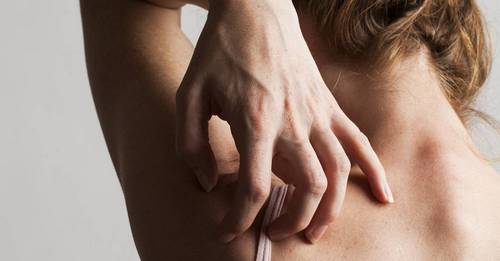However, while nothing soothes that God forsaken head-to-toe itch quite like scratching yourself silly, we really urge you to resist the temptation as scratching will only cause your skin more trauma. Whether it’s your arms, legs, bum or torso that’s tingling, it turns out there are ways to say goodbye to itchy skin once and for all.
If you find yourself scratching at your limbs more often that you should, rest assured that you’re not alone. After a summer of exposing your skin to the elements, it’s totally normal for it to be feeling a little drier and more irritated than usual. So much so that when irritation hits a certain peak, it’s possible for your skin to become itchy. And we’re talking seriously itchy.
As a matter of fact, itchy skin is such a common issue that it has its own special medical name: pruritus. The British Association of Dermatologists reveal that in any two-week period 8-9% of the population suffer from significant pruritus commonly caused by dryness. Itching will affect most adults at some point in their life. Studies have shown that chronic itching (lasting longer than 6 weeks) can occur in up to 16% of the population and gets more common the older we get.
If you’re as desperate as we are to stop scratching, listen up. We’ve enlisted the help of Kay Greveson, Aesthetic Nurse Practitioner and founder of Regents Park Aesthetics, to reveal all there is to know about dry, itchy skin and how to get rid of it for good…

Why do we get itchy skin?
Much like most skin issues, there isn’t one single cause, but instead a whole bunch of possibilities and contributing factors. Kay says: “Pruritus can be caused by dry or irritated skin but it may also be the sign of a medical condition such as eczema or an allergy to something. Many women also have itchy skin during pregnancy or after the menopause which is caused by hormonal changes and should get better over time.”
Where is it most common to experience itching?
While itching can spring up anywhere on the body, people that complain of itching skin for no apparent reason usually find it affects their legs, bum and arms the most. Kay explains: “Dry, itchy skin can often occur on the legs, possibly due to the fact they are usually covered by potentially irritating clothing.”
What can be done to help itchy skin?
First and foremost, it’s time to rethink your body care regime. “Switch to non-perfumed moisturisers as they will hydrate the skin without irritating. Although products containing antioxidants and active ingredients are advised in usual circumstances, these may cause skin irritation and itching. If you have recently started using a new product and have noticed your skin itching then it maybe an ingredient in the product that is causing it,” advises Kay.
Your best bet? Kay advises using an emollient (a thick, oil-based cream) to create a seal on the skin and prevent any moisture loss. “Lotions are mainly water-based and may not provide the long-lasting moisture your skin needs.”
What can be done to treat itchy skin?
For soothing itchy skin and making sure your skin stays as hydrated and non-irritated as possible, Kay advises the follow:
- Avoid tight clothes made of wool or synthetic fabrics.
- Keep baths or showers to less than 20 minutes to avoid skin irritation from hot water, soaps and shower gels.
- Avoid perfumed soaps, deodorants or moisturisers.
- Spicy foods, alcohol and caffeine can make itching worse, so try avoiding them for a while to see if itching improves.
- Use moisturiser after you bathe while your skin is still damp.
- Drink lots of fluids to stay hydrated.
- Use mild skin products.
If you have followed the advice above and the itching is affecting your daily life, lasts for longer than two weeks or keeps coming back, then it is advisable to seek medical advice.



